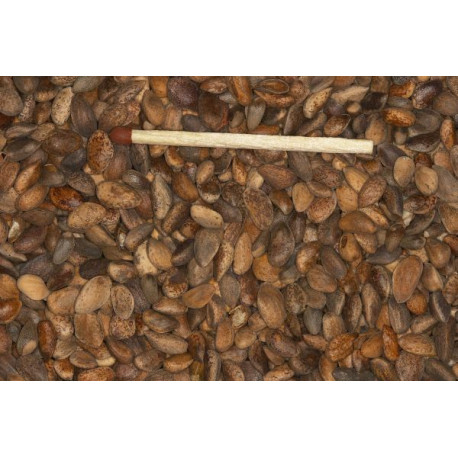- In the process of being restocked




Reference: 161603-500G
Pine seeds are a good source of Phosphorus, Magnesium, Zinc, Manganese, Copper, Iron, Vitamin E, K, B1, B2, B3, B9.
Pine seeds are a good source of Phosphorus, Magnesium, Zinc, Manganese, Copper, Iron, Vitamin E, K, B1, B2, B3, B9.
Striated sunflower is the basic seed of any parrot mixture. It is also used in mixtures for parakeets and exotic doves.
It is also the favorite food of your outdoor birds during the winter period! Ideal for feeding the birds in your garden.
Practical information for giving sunflower seeds to birds in your garden:
Remember to regularly clean the feeders of your outdoor birds so that diseases and bacteria do not thrive.
Also consider setting feeders high up to prevent predators (such as cats, foxes, etc.) from targeting birds when they are eating.
Peeled peanuts are treats highly appreciated by parrots.
They should be distributed sparingly as they are rich.
An ideal food to fill your feeders for wild birds, they will provide the necessary fat for birds to get through the winter more easily.
A favourite of tits and a real delicacy for many birds.
Niger seed is a bird seed rich in phosphorus and calcium.
Niger seeds (or nyjer seeds) are fine seeds rich in oil.
They come from Guizotia abyssinica (also called Oleiferous Guizotia).
Niger is very popular with most birds, goldfinches and tarins love it.
Niger is one of the few bird seeds with a good calcium/phosphorus ratio.
Couscous is a hard grain semolina that is steamed until the small grains are obtained, which are then dried. Couscous is excellent for supplementing the feeding food of nestlings or adults. Wet the couscous with hot water, let it swell for a few minutes then add to the egg food (for 1 teaspoon of couscous plan 4-5 teaspoons of food), coloring, fruit.
Millet is used in the diet of all birds: straight beaks and hooked beaks. In clusters, it's a delicacy they love.
Millet in clusters has a good protein and carbohydrate content and it also contains a large number of amino acids. Ideal to distract your birds and thus avoid pecking (pulling feathers).
We advised to give red millet for exotic birds. It is richer in protein than yellow millet.
Extra wheat, very good quality, for all types of birds and ornamental animals, pigeons, chickens, parrots, parakeets, doves...
Paddy rice seed or raw rice is perfectly suitable for exotic birds with strong beaks such as the Java sparrow and Asian-origin birds. This seed is also appreciated by parakeets, parrots, and exotic doves.
The peeled oats from Versele-Laga are a high-quality food primarily intended for birds. Offered in a 25 kg bag, these peeled oats are ideal for bird enthusiasts wishing to provide a nutritious and natural diet to their birds.
Peeled oats are rich in essential nutrients for birds.
The wild rose is a wild rose bush whose rose hips are consumed in autumn and are very rich in vitamin C.
Canary seed is a grass, an annual plant that can reach up to 1m in height, with seeds found in the inflorescences. These seeds make up a significant portion of most bird seed mixes.
• Excellent for canaries, European and exotic birds, budgerigars, and large parakeets.
• EXTRA canary seeds have undergone additional cleaning and are of exceptional quality. Unique on the market!
Peeled sunflower seeds are suitable for your budgies and parrots but also for straight beaks that live in outdoor aviaries in winter.
Sunflower seed contains almost 40% fat, but also proteins, carbohydrates, vitamins B and E. We quantify on a sunflower seed nearly 600 Kcalories per 100 g.
It satisfies throughout the year, the needs of a wide variety of birds, including the smallest of them.
Sunflower seeds are a real treat for our birds who love them!
No waste, no waste! The garden stays clean!
Pine seeds are a good source of Phosphorus, Magnesium, Zinc, Manganese, Copper, Iron, Vitamin E, K, B1, B2, B3, B9.
Chia is sage. It is an annual plant up to 1 m tall whose scientific name is Salvia hispanica.
The composition of chia seed closely resembles that of other mucilaginous seeds such as flaxseeds and psyllium. Unlike flaxseed, however, chia does not have anti-nutritional factors, factors that limit the use of flaxseed without prior hot treatment. Anti-nutritional factors are cyanogenic glycosides or linatins, inhibitors of vitamin B6 that prevent its action. Chia also has a much more pleasant taste than flaxseed and birds consume it more willingly.
Rowan berry in dried fruit form, which hooked beaks, native birds, and tropical birds are fond of. Use it to enrich your seed mixes or as treats. Dried fruits have a very long shelf life. Use them daily and in every season for a balanced diet to avoid deficiencies.

Pine seeds are a good source of Phosphorus, Magnesium, Zinc, Manganese, Copper, Iron, Vitamin E, K, B1, B2, B3, B9.
